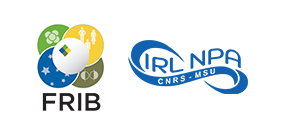The Nuclear Physics and Dense Matter Equation of State Workshop will be held at the Facility for Rare Isotope Beams (FRIB) on the campus of Michigan State University (MSU) in East Lansing, MI USA, on December 8-12, 2025.
The Dense Matter Equation of State Workshop is organized within the scope of activities of the CNRS-MSU International Research Laboratory on Nuclear Physics and Nuclear Astrophysics (IRL-NPA).

The Facility for Rare Isotope Beams (FRIB) is a world-leading rare isotope beam facility, whose mission is to advance science by supporting research in a broad range of areas, including studying the structure of exotic nuclei, astrophysical processes, tests of fundamental symmetries, and societal applications and benefits.
Building the Future of Nuclear Physics
We are excited to announce a new workshop aimed at fostering collaboration between researchers from CNRS's "Nuclei and Particles" laboratories in France and scientists at the Facility for Rare Isotope Beams (FRIB).
This event is designed to create a direct dialogue and pave the way for new partnerships. Our goal is to bring together experts from both sides of the Atlantic to exchange ideas, share recent progress, and explore potential new collaborations in the field of Nuclear physics constraints for the dense matter equation of state.
By connecting these two communities, we hope to leverage our collective expertise to drive innovation and discovery in nuclear science.
Unraveling the Neutron Star Equation of State
The nature of neutron stars is one of the most compelling questions in modern physics and a key to understanding dense matter. At this workshop, we will bring together leading experts in nuclear physics, astrophysics, and gravitation wave research to tackle a specific and pressing question: What is the pressure of dense matter at two times saturation density?
Recent gravitational wave observations from binary neutron star mergers and X-ray emission from millisecond pulsars have provided an exciting new avenue for answering this question, offering predictions based purely on astrophysical measurements. Nuclear physics, however, provides its own unique set of constraints and predictions.
Our Goal
This focused workshop aims to directly compare and contrast predictions for the equation of state at twice saturation density. By gathering predictions derived from nuclear physics constraints and discussing their underlying uncertainties, we will facilitate a deeper mutual understanding between the nuclear physics and astrophysical communities. While a perfect match between these different approaches isn't expected, a comparison will reveal invaluable insights and highlight areas where models may need to be re-examined.
Special attention will be given to the origins of uncertainties and the constraints used in these predictions. The workshop will culminate in a dedicated discussion to compare the various estimates, exploring whether they overlap or diverge. The results of this comparison will be a powerful tool for advancing our knowledge of dense matter and the fundamental building blocks of neutron stars.
Invited Speakers:
- David Blaschke (Univ. Wroclaw),
- Kyle Brown (FRIB East Lansing),
- Zbigview Chajecki (WMU Kalamazoo),
- Guy Chanfray (IP2I Lyon),
- Veronica Dexheimer (KU Ohio),
- Anthea Fantina* (GANIL Caen),
- Diego Gruyer (LPC Caen),
- Sébastien Guillot* (IRAP Toulouse),
- Jeremy Holt (Texas A&M),
- Rohit Kumar*,
- Sudhanva Lalit (FRIB East Lansing),
- Arnaud Lefèvre (GSI Darmstadt),
- Bao-An Li (Texas A&M),
- Bill Lynch (FRIB East Lansing),
- William Newton (Texas A&M),
- Jorge Piekarewicz* (FSU Tallahassee),
- Bikram Pradhan (IP2I Lyon),
- Oleh Savchuk (FRIB East Lansing),
- Agnieska Sorensen (FRIB East Lansing),
- Betty Tsang (FRIB East Lansing),
- Giuseppe Verde (INFN Catane).
* remote participation.
Participants
Our goal is to bring together a diverse group of experts to foster collaboration and insightful discussion. The workshop will feature talks from leading scientists in Europe and in the USA.
This event is a unique opportunity to connect with a broad range of experts and contribute to the future of nuclear science. We encourage all interested researchers to come and participate in our workshop.

